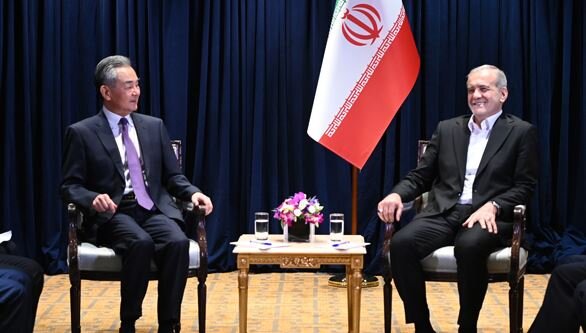China’s intervention essential in halting Zionist aggression: Pezeshkian

TEHRAN – In an engagement on the sidelines of the United Nations General Assembly, Iranian President Masoud Pezeshkian met with Chinese Foreign Minister Wang Yi to discuss pressing regional issues, particularly the humanitarian crisis in Gaza.
During their meeting, President Pezeshkian emphasized the critical role China plays in promoting global peace and security. He described the ongoing violence in Gaza and Lebanon as a "humanitarian catastrophe," asserting that China's condemnation and intervention are essential in halting the crimes committed by the Zionist regime.
"The events in Gaza and Lebanon, backed by nations claiming to uphold human rights, are unacceptable," stated Pezeshkian. He called for a united front among countries that resist oppression, asserting that such solidarity would deter further aggression from the Zionist regime.
The Iranian President underscored the historical and deep-rooted relationship between Iran and China, expressing a desire to expand cooperation across various sectors. He praised China's "Belt and Road" initiative, suggesting that enhanced transportation routes could foster economic growth and sustainable security in the region.
In response, Foreign Minister Wang Yi reaffirmed China's commitment to strengthening ties with Iran. He noted that the current geopolitical landscape presents an opportunity for enhanced economic relations, despite external pressures. "We will strive for progress and economic growth for both nations," he remarked.
Wang Yi also condemned the actions of the Israeli regime in Gaza, labeling them unjust and harmful to the Palestinian people. He reiterated China's support for Iran's efforts to lift sanctions and emphasized the importance of Islamic countries fulfilling their responsibilities in advocating for Palestinian rights.
As discussions continued between Iranian officials and their Chinese counterparts, both sides expressed optimism about their collaborative efforts to address regional challenges and foster mutual development.
